In a crowded online marketplace, simply listing products isn't enough. Successful ecommerce brands understand that building an audience, fostering trust, and solving customer problems are the real drivers of sustainable growth. This is where strategic content marketing makes the difference. It transforms a transactional relationship into a loyal community, turning one-time buyers into lifelong advocates. The goal is to create value far beyond the checkout page, establishing your brand as an indispensable resource in your niche.
This article moves beyond theory to provide a tactical breakdown of real-world ecommerce content marketing examples. We will dissect the strategies of leading platforms like Shopify, HubSpot, and Semrush to reveal precisely how they use content to attract, engage, and convert their target audiences. For each example, you’ll find a detailed analysis, actionable takeaways, and direct links so you can see their work firsthand. You'll learn not just what they did, but why it works and how you can adapt their methods for your own business.
For a deeper dive into the foundational principles that drive successful content initiatives, consider exploring these content marketing best practices. Let's explore the examples that showcase content's true power.
1. Shopify: The Blueprint for Educational Ecommerce Content
Shopify has mastered a content marketing strategy that goes far beyond simply selling its ecommerce platform. Instead of focusing on product features, Shopify provides immense value to its target audience of aspiring and current entrepreneurs. This approach positions them not just as a tool provider, but as an indispensable partner in business growth, making them one of the most powerful ecommerce content marketing examples available today.
Their content ecosystem is vast, covering everything from initial business ideas to scaling a global enterprise. The core of this strategy is the Shopify Blog, a comprehensive resource that addresses nearly every question an entrepreneur might have.
Strategic Breakdown
Shopify’s strategy is built on a foundation of educational, top-of-funnel content that captures a massive audience through organic search. They target keywords related to starting and growing a business, rather than just "ecommerce platform." This attracts users who may not even be ready for a platform yet, building brand trust early in the customer journey.
Key Insight: By solving the user's primary problems (e.g., "how to find a product to sell" or "how to market a new store"), Shopify becomes the default solution when it's time to choose a platform. The content sells the platform implicitly.
Actionable Takeaways for Your Brand
- Solve Audience Problems, Not Just Product Problems: Identify the core challenges your customers face before they need your product. Create in-depth guides, tools, and resources that address these pain points.
- Create Pillar Content: Develop long-form, authoritative guides on broad topics relevant to your industry. Shopify's "How to Start an Online T-Shirt Business" is a classic example that generates traffic and leads for years.
- Build an Ecosystem: Don't just rely on a blog. Shopify complements its articles with podcasts (like Shopify Masters), free business tools (logo maker, business name generator), and detailed case studies. This multi-format approach captures a wider audience and reinforces their authority.
By focusing on education and empowerment, Shopify has created a content marketing engine that drives brand loyalty and organic growth, proving that the best way to sell your product is to become an essential resource for your customers.
Website: Shopify Blog
2. HubSpot: The Academy and Arsenal for Content Marketers
HubSpot has evolved from a CRM leader into an essential educational resource and toolset for marketers. Its content marketing strategy is meta; it teaches content marketing through exceptional content marketing, positioning itself as the go-to authority for anyone looking to grow a business online. This makes it a prime destination for studying ecommerce content marketing examples and acquiring the tools to execute them.
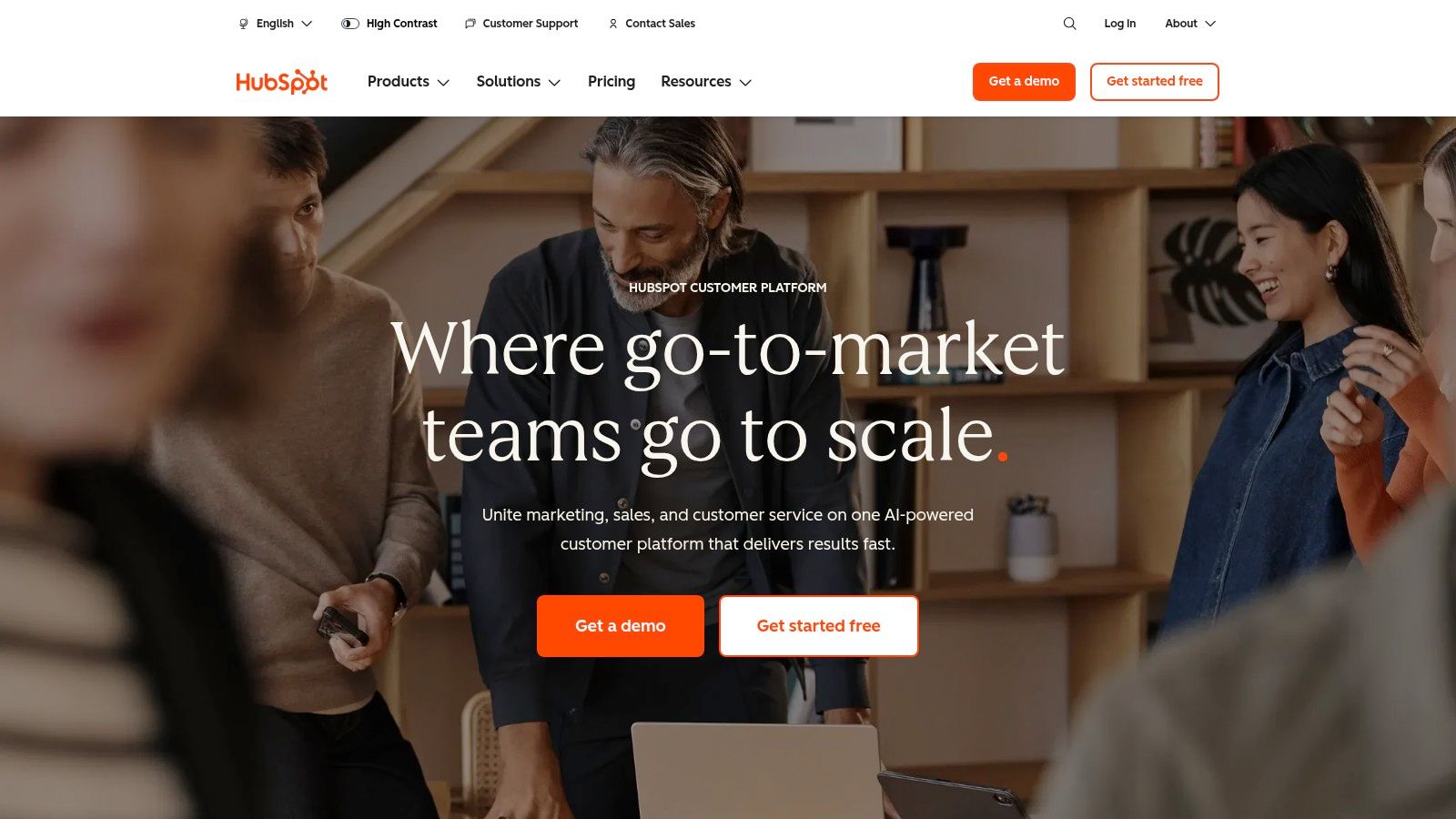
The HubSpot ecosystem offers two distinct value propositions. First, its world-renowned blog and Academy provide free, university-level education on every marketing topic imaginable. Second, its Content Hub platform offers a paid, integrated suite of tools to centralize and scale content operations, from AI-powered creation to SEO optimization.
Strategic Breakdown
HubSpot’s strategy is to educate and equip. By offering immense value upfront through free courses, templates, and in-depth articles, it builds a massive, loyal audience. This audience, armed with HubSpot's knowledge, naturally considers HubSpot's software when they need to scale their operations. The free content acts as the ultimate lead magnet for its powerful, paid software suite.
Key Insight: HubSpot proves that you can become the market leader by teaching your customers how to succeed. Their educational content doesn't just attract leads; it creates better, more sophisticated customers who understand the value of a powerful marketing platform.
Actionable Takeaways for Your Brand
- Offer Gated, High-Value Resources: Provide tangible assets like templates, kits, or checklists in exchange for an email address. HubSpot's "Ecommerce Marketing Plan Kit" is a perfect example of a resource that solves a specific, high-intent problem for its target audience.
- Combine Education with a Solution: Don't just teach the "what" and "why"; show how your product is the "how." Structure your content to naturally lead users toward your solution after you've educated them on the problem.
- Tier Your Offerings: Create a clear path from free resources to paid products. HubSpot guides users seamlessly from a blog post to a free template, then to a demo of its Content Hub. This tiered approach nurtures leads effectively at every stage of their journey.
By seamlessly blending free, actionable education with a scalable software solution, HubSpot provides a masterclass in turning expertise into a powerful engine for customer acquisition and long-term loyalty.
Website: HubSpot
3. Content Marketing Institute (CMI): The Playbook for Content Strategy
While not an ecommerce store itself, the Content Marketing Institute (CMI) is an indispensable meta-resource for any brand serious about content. Instead of selling a product, CMI sells knowledge, offering deep analysis on what makes great content work. This makes it a crucial stop for marketers looking to understand the "why" behind successful ecommerce content marketing examples.
CMI's strategy is to be the definitive educational authority on all things content. They deconstruct campaigns from major brands, providing actionable insights that ecommerce businesses can adapt and apply to their own efforts, from blog creation to social media strategy.
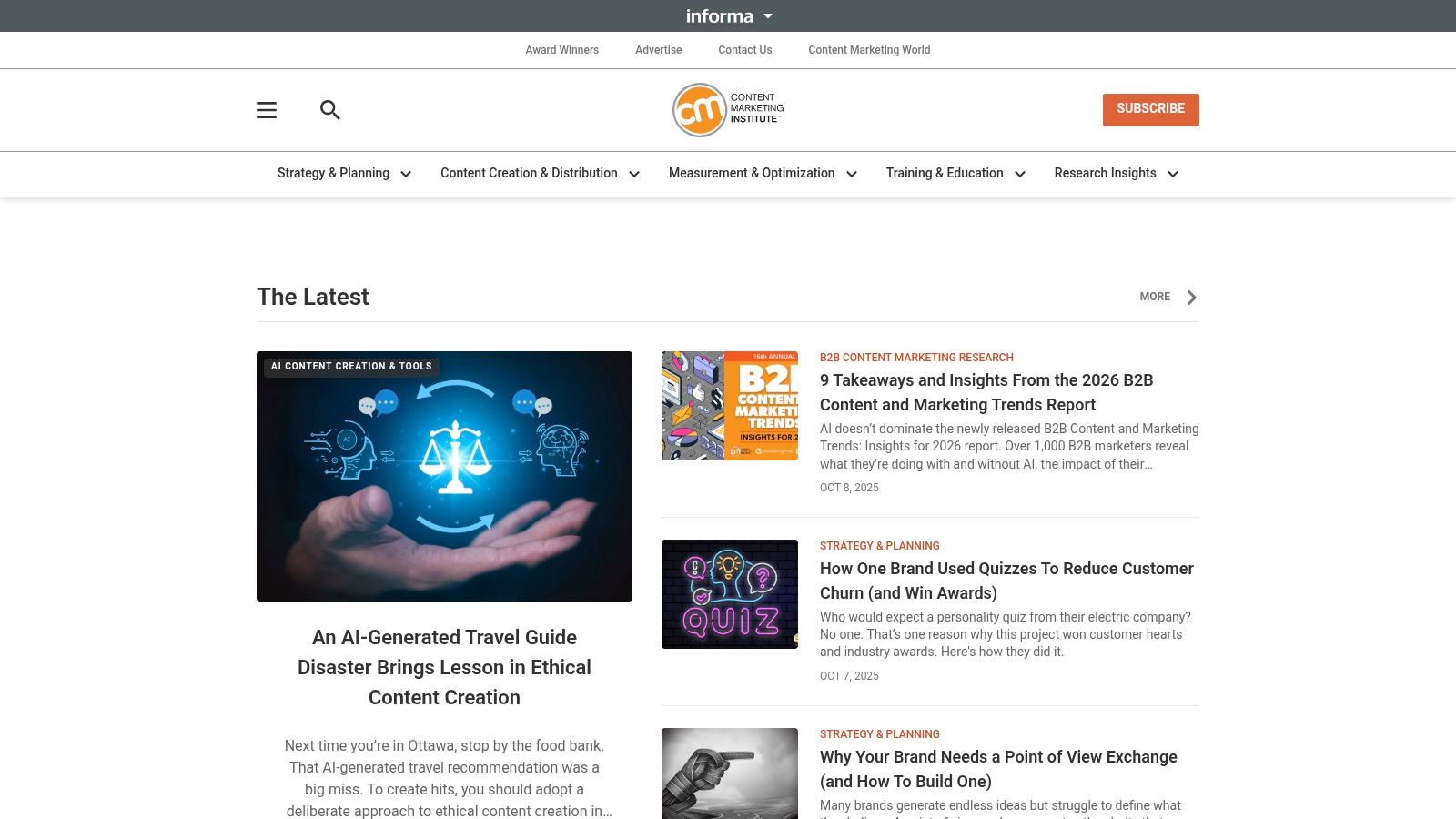
Strategic Breakdown
CMI’s approach is built on providing neutral, high-level analysis. They focus on the strategic frameworks, creative processes, and distribution channels that lead to success. By showcasing a wide array of case studies, they empower marketers to see beyond their own industry and borrow proven tactics from different sectors.
Key Insight: CMI teaches you how to think like a content strategist. By analyzing what works for brands like Red Bull or Kraft, you learn the underlying principles of engagement and can apply them to your own ecommerce niche.
Actionable Takeaways for Your Brand
- Study the 'Why,' Not Just the 'What': Don't just copy another brand's campaign. Use CMI's articles to understand the strategic reasoning behind it. Ask why a certain format was chosen or how a distribution channel supported the overall goal.
- Borrow from Other Industries: Look at CMI’s B2B and non-ecommerce examples. A successful content strategy for a software company might spark a new idea for marketing your physical products.
- Benchmark Your Efforts: Use the examples on CMI as a benchmark for quality and creativity. This can elevate your content from being merely functional to becoming a true brand asset, an essential lesson for any team exploring content marketing for small businesses.
By acting as a library of strategic breakdowns, CMI gives ecommerce brands the tools to build smarter, more effective content marketing plans that are grounded in proven principles.
Website: Content Marketing Institute
4. Mailchimp: Empowering Marketers Through Actionable Content
Mailchimp has evolved far beyond a simple email service provider, positioning itself as an all-in-one marketing platform for small businesses. Its content marketing strategy is a direct reflection of this evolution, focusing on empowerment, education, and providing actionable resources that help its audience succeed. This makes it one of the most practical and effective ecommerce content marketing examples for brands looking to build user proficiency and loyalty.
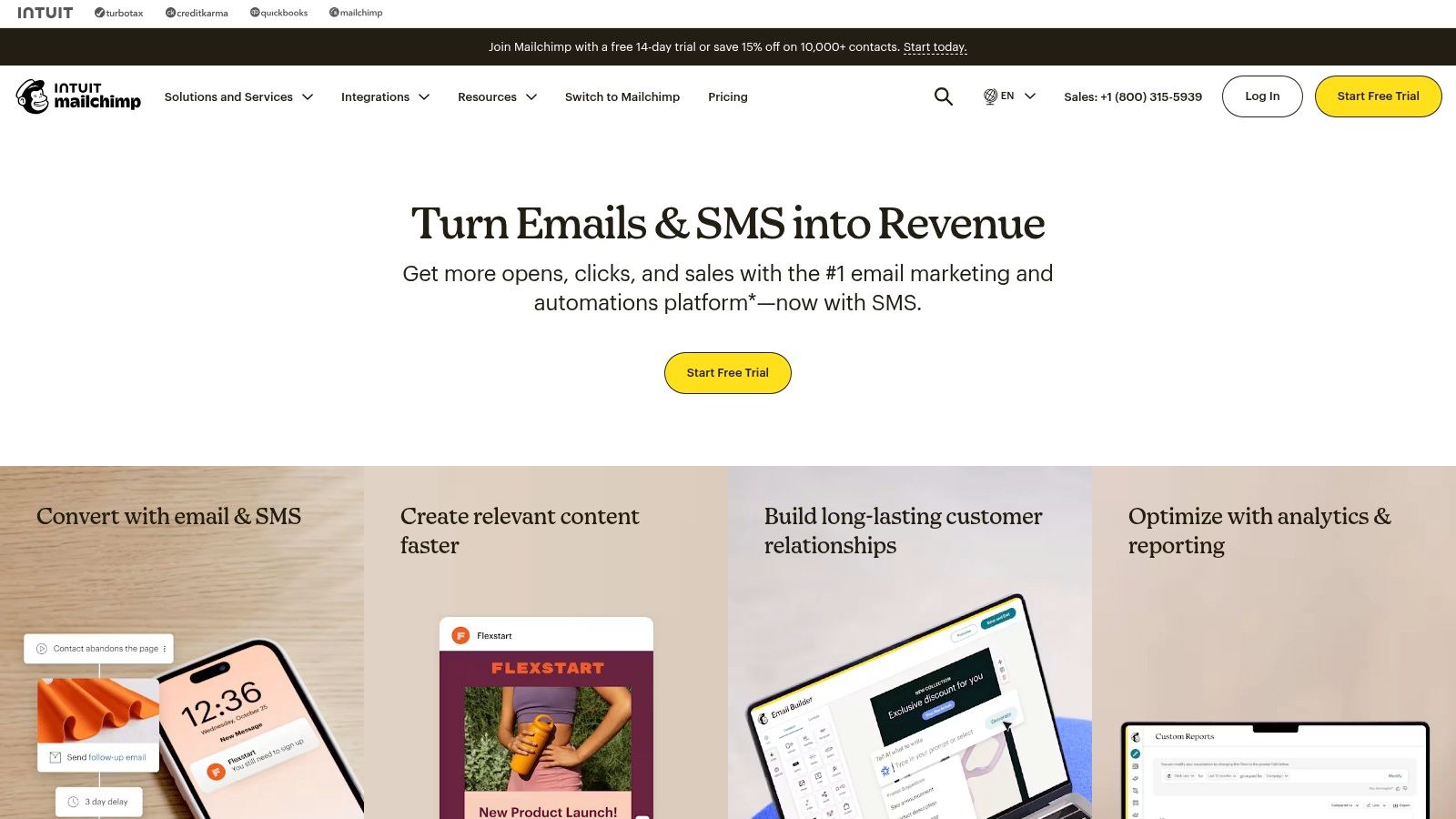
Their content hub, Mailchimp Presents, and their extensive resource library go beyond basic tutorials. They offer inspiration, case studies, and practical guides that teach the why behind marketing tactics, not just the how of using their platform.
Strategic Breakdown
Mailchimp’s content strategy is built to reduce the friction of getting started with marketing. By offering a vast library of pre-built, goal-oriented email templates (e.g., for product launches or cart abandonment), they directly address the immediate needs of ecommerce businesses. Their content then serves to educate users on how to best leverage these tools for maximum impact.
Key Insight: Mailchimp provides the tools and the playbook simultaneously. It lowers the barrier to entry with easy-to-use templates and then builds user confidence and sophistication through educational content, encouraging upgrades to more advanced, paid features.
Actionable Takeaways for Your Brand
- Create "Getting Started" Resource Hubs: Develop a centralized library of tutorials, templates, and guides specifically designed to help new customers achieve a quick win with your product. Mailchimp’s objective-based template gallery is a perfect model.
- Combine Inspiration with Instruction: Don't just show users how to do something; show them what's possible. Mailchimp features success stories and creative campaigns from its users, inspiring others while subtly showcasing the platform's capabilities.
- Educate on Core Concepts: Teach the fundamentals of your industry, not just your product. By providing valuable knowledge on broader topics, like these email marketing tips, you attract a wider audience and build authority, making your product the logical next step.
By seamlessly blending functional tools with strategic education, Mailchimp ensures its users are not just customers, but successful marketers who are more likely to grow with the platform over time.
Website: Mailchimp
5. Really Good Emails: The Ultimate Email Marketing Swipe File
Really Good Emails (RGE) offers a unique form of content marketing by creating a resource that is, in itself, the content. Instead of writing articles about email marketing, RGE curates and showcases over 15,000 real-world email examples from top ecommerce brands. This positions them as the go-to library for inspiration, making them an indispensable tool for marketers and one of the smartest ecommerce content marketing examples for a niche audience.
Their platform functions as a massive, searchable database, allowing users to find specific email types like welcome sequences, abandoned cart reminders, and promotional campaigns. By providing this immense value for free, RGE builds a loyal community and a powerful lead magnet for its Pro features.
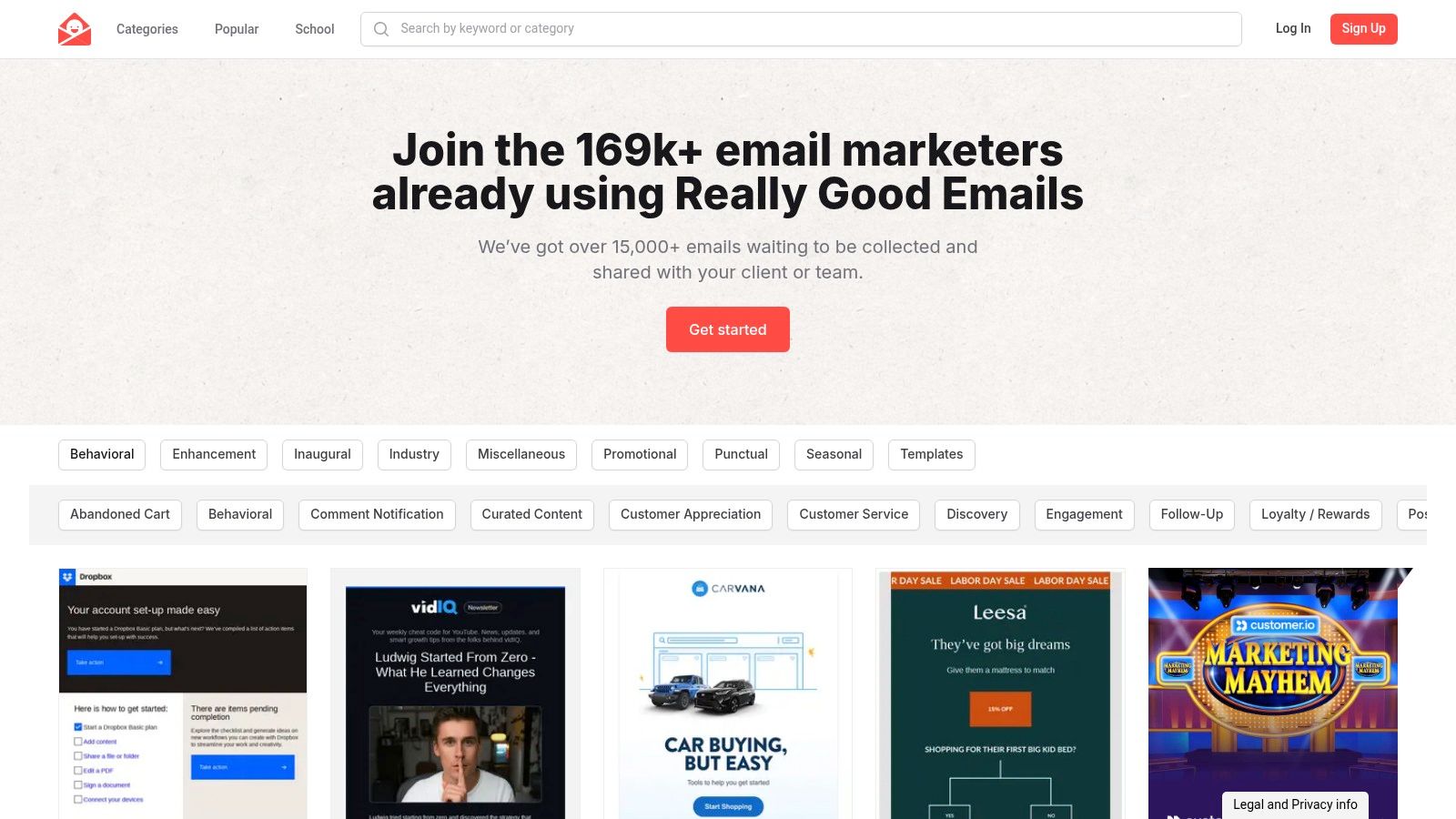
Strategic Breakdown
RGE’s strategy hinges on user-generated and curated content. They have built a platform that other brands are eager to be featured on, creating a self-sustaining content engine. Their value proposition is not telling marketers what to do, but showing them what successful brands are actually doing, which is a far more powerful and practical approach.
The platform is designed for quick, actionable inspiration. Its intuitive search and filtering capabilities (by industry, email type, or even company) make the user experience seamless, reinforcing its role as an essential daily tool rather than just a one-off resource.
Key Insight: Your product can be the content. By creating an invaluable, free-to-use resource that solves a specific, recurring problem for your target audience, you build unparalleled authority and a natural funnel for your premium offerings.
Actionable Takeaways for Your Brand
- Become a Curator in Your Niche: You don't always have to create content from scratch. Curate and organize the best examples, resources, or tools within your industry. This positions you as a central hub and trusted expert.
- Build a Community-Powered Content Engine: Encourage users to submit their own work or examples. This not only reduces your content creation burden but also fosters a sense of community and gives other brands a platform for exposure.
- Solve a Micro-Problem Brilliantly: RGE focuses exclusively on one thing: email design and strategy. By niching down and offering deep value in one specific area, they have become the undisputed leader in that space.
Website: Really Good Emails
6. Marketing Examples: The Tactical Playbook for High-Impact Content
Marketing Examples, created by Harry Dry, takes a fundamentally different approach to content marketing education. Instead of long-form guides, the platform delivers bite-sized, highly visual case studies that break down what makes a piece of marketing effective. It serves as a tactical library for marketers, making it one of the most practical ecommerce content marketing examples for those who need immediate, actionable ideas.
The site’s genius lies in its simplicity and focus on replicable tactics. It deconstructs everything from landing page copy and abandoned cart emails to social media ads and referral programs, showing exactly why they work with clear annotations and minimal fluff.
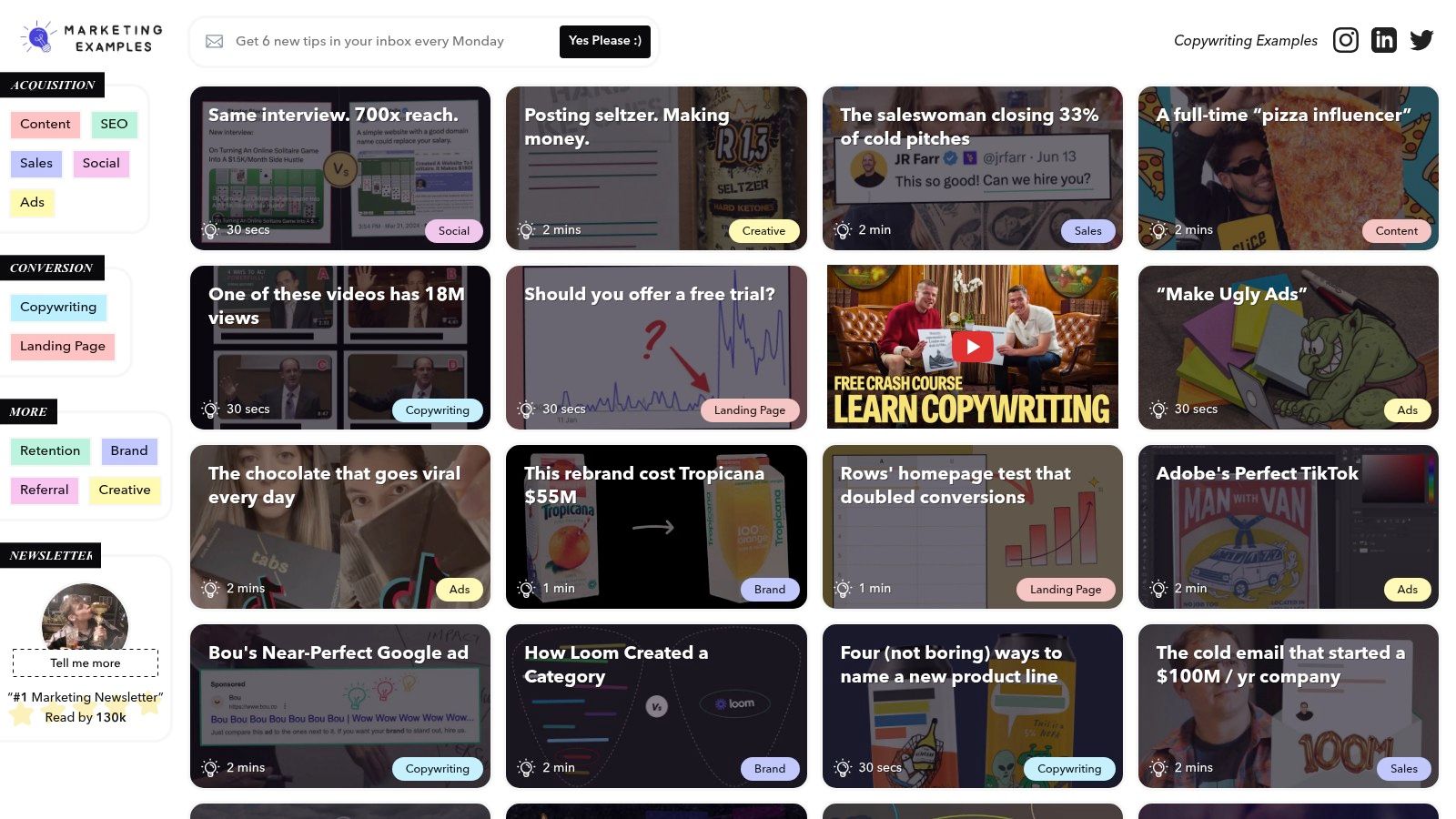
Strategic Breakdown
Marketing Examples operates on a "show, don't just tell" principle. Each entry is a mini-masterclass in marketing psychology and execution. By presenting real-world examples from successful brands (including many direct-to-consumer and ecommerce businesses), it bypasses theoretical advice and provides proven templates for inspiration. The content is designed for quick consumption and immediate application.
This strategy builds authority not through volume, but through consistent, high-quality insights. The free access model, supported by a popular newsletter, creates a loyal following of marketers who turn to the site for a quick hit of inspiration or a solution to a specific problem.
Key Insight: Actionable, snackable content can be just as powerful as long-form articles. By removing friction and delivering instant value, Marketing Examples has become a go-to resource for marketers seeking tactical solutions rather than broad-stroke strategies.
Actionable Takeaways for Your Brand
- Deconstruct Success: Don't just admire a competitor's campaign. Break it down piece by piece. Analyze the headline, the call-to-action, the imagery, and the core message. Create your own internal library of "what works."
- Embrace Visual Explanations: Use annotations, highlights, and side-by-side comparisons to make your points. This is far more effective for teaching tactical concepts than dense paragraphs of text.
- Focus on One Key Idea: Each piece of content on Marketing Examples typically focuses on a single, powerful tactic. Avoid trying to teach everything at once. Create content that provides one clear, memorable, and immediately usable takeaway.
By curating and dissecting effective marketing in a visually engaging format, Marketing Examples proves that value doesn't always have to be lengthy. It's a testament to the power of clarity, conciseness, and tactical education in building an authoritative brand.
Website: Marketing Examples
7. Semrush: The Toolkit for Data-Driven Content Strategy
While not a direct ecommerce brand, Semrush provides an indispensable platform that powers the content marketing for thousands of online stores. Instead of selling a physical product, Semrush sells the data and tools necessary to create a winning content strategy, making it a meta-example of an essential component in modern ecommerce content marketing examples.
The platform’s strength lies in its Content Marketing Toolkit, a suite of features designed to take the guesswork out of content creation. It helps ecommerce teams discover what their audience is searching for, how to structure content to rank on Google, and how to measure the ROI of their efforts, from blog posts to product descriptions.
Strategic Breakdown
Semrush's strategy is to empower marketers with actionable data. By providing tools for topic research, SEO-optimized writing assistance, and performance tracking, it enables ecommerce businesses to replicate the content successes of industry leaders. It moves content from a purely creative exercise to a data-backed business driver. The platform is built for teams that need to justify their marketing spend with tangible results like traffic, leads, and sales.
Key Insight: Semrush helps ecommerce brands win at content marketing by shifting their focus from simply writing to strategically engineering content that answers user questions and ranks high in search results, directly impacting the bottom line.
Actionable Takeaways for Your Brand
- Conduct Data-Driven Topic Research: Use tools like Semrush's Topic Research to find sub-topics and common questions your audience is asking. This ensures you create content that people are actively looking for, rather than guessing what might resonate.
- Optimize Content Before Publishing: Leverage tools like the SEO Writing Assistant to check your content's readability, tone of voice, and SEO potential against top-ranking competitors in real-time. This proactive optimization increases your chances of ranking from day one.
- Audit and Improve Existing Content: An effective content strategy isn't just about creating new articles. Use a content audit tool to identify underperforming pages on your ecommerce site. A simple update or optimization can often deliver significant traffic gains with minimal effort.
Semrush's platform is a powerful reminder that the best content is born from a deep understanding of audience intent and search data. It's a crucial tool for any ecommerce brand serious about scaling its organic traffic and authority. Note that the full Content Marketing Toolkit is available on their higher-tier plans, which may present a cost barrier for smaller businesses.
Website: Semrush
Ecommerce Content Marketing Examples Comparison
| Platform | 🔄 Implementation Complexity | ⚡ Resource Requirements | 📊 Expected Outcomes | 💡 Ideal Use Cases | ⭐ Key Advantages |
|---|---|---|---|---|---|
| Shopify | Medium – Case study application varies by brand | Low – Free access, no technical setup | High – Measurable ecommerce growth tactics | Ecommerce marketers seeking proven flows | Real store examples with detailed analysis |
| HubSpot | Medium-High – Paid features for AI and workflow | Medium – Some templates gated, paid tiers for full features | High – Scalable content operations with AI | Teams scaling ecommerce marketing efforts | Combines learning with content platform |
| Content Marketing Institute (CMI) | Low – Educational articles, no tools | Low – Free educational content | Medium – Improved content strategy & planning | Marketers focused on multi-channel content | Neutral, tool-agnostic deep analysis |
| Mailchimp | Low-Medium – Guided templates and automation setup | Low-Medium – Free and paid marketing plans | Medium-High – Fast campaign launches | Small teams needing quick email/SMS campaigns | Easy for beginners with integrated marketing |
| Really Good Emails (RGE) | Low – Searchable email examples only | Low – Free and affordable Pro option | Medium – Strong email flow inspiration | Email marketers needing creative ideas | Large curated ecommerce email archive |
| Marketing Examples | Low – Simple example breakdowns, no tools | Low – Free access | Medium – Quick actionable marketing tactics | Marketers needing quick insights across channels | Highly actionable, minimal fluff |
| Semrush | High – Requires SEO/content tool learning | High – Paid plans required for full features | High – Data-driven content optimization | Ecommerce teams needing SEO and performance tracking | Comprehensive AI and SEO content toolkit |
From Inspiration to Implementation: Your Next Steps
We've explored a diverse range of powerful ecommerce content marketing examples, from Shopify's educational ecosystem to Mailchimp's relatable brand storytelling. Each case study demonstrates a core principle: successful content marketing isn't just about creating content; it's about building a strategic asset that attracts, engages, and converts a specific audience. The common thread weaving through these successes is a deep understanding of customer needs, a commitment to providing genuine value, and the smart application of tools to scale and measure impact.
These brands didn't just get lucky. They built their authority by consistently delivering high-quality, relevant information that solved problems for their audience. HubSpot empowers marketers with data-driven insights, while Marketing Examples breaks down complex strategies into digestible, real-world applications. They prove that by focusing on your audience's pain points and aspirations, you can transform your brand from a simple seller into an indispensable resource.
Distilling the Core Strategies
As you move from inspiration to action, remember these fundamental takeaways from the examples we analyzed:
- Educate Before You Sell: Like Shopify and HubSpot, focus on creating content that answers your audience's most pressing questions. This builds trust and positions your brand as a helpful expert, making the eventual sale a natural next step.
- Embrace Your Niche: Really Good Emails and Marketing Examples thrive by doing one thing exceptionally well. Don't try to be everything to everyone. Identify a specific niche where you can provide unparalleled value and become the go-to source.
- Leverage Data and Tools: Semrush is both a tool and a prime example of using data to create authoritative content. Use analytics to understand what resonates with your audience and to uncover new content opportunities. Data should guide every strategic decision you make.
- Consistency is Key: Content Marketing Institute has built a content empire through relentless consistency. A one-off viral post is great, but a long-term, sustained content strategy is what builds a loyal audience and lasting authority.
Your Action Plan for Content Success
Ready to apply these lessons? Here’s a simple framework to get started:
- Define Your Audience and Niche: Who are you trying to reach? What unique problems can you solve for them? Get crystal clear on this before writing a single word.
- Choose Your Primary Content Channel: Will you focus on a blog like Semrush, a resource hub like HubSpot, or a curated collection like RGE? Start with one primary channel and master it before expanding.
- Map Out a Content Calendar: Plan your topics based on keyword research, customer questions, and industry trends. Having a plan ensures consistency and strategic alignment.
- Create and Distribute: Focus on creating high-quality, valuable content. But don't stop there. A great distribution strategy is just as important. This includes SEO, email marketing, and social media. For practical guidance on generating engaging material across social platforms, explore these 10 Actionable Content Ideas for Social Media.
- Measure, Analyze, and Iterate: Use tools to track your performance. What content is driving traffic and conversions? Double down on what works and refine what doesn’t.
Ultimately, the best ecommerce content marketing examples show us that success comes from a genuine desire to help your audience. By adopting this value-first mindset and applying the strategic frameworks we've discussed, you can build a powerful content engine that drives sustainable growth for your business.
Feeling inspired by these examples but need help executing a high-level content strategy? Copy Masters specializes in creating SEO-optimized, data-driven content that turns brands into authorities. Let our team of expert writers and strategists build the content engine you need to attract, engage, and convert your ideal customers by visiting Copy Masters.
- SaaS SEO Consulting for Predictable Growth - October 20, 2025
- What Is SEO Management Your Guide to Real Results - October 19, 2025
- A Guide to Quality Content for SEO That Ranks - October 18, 2025
